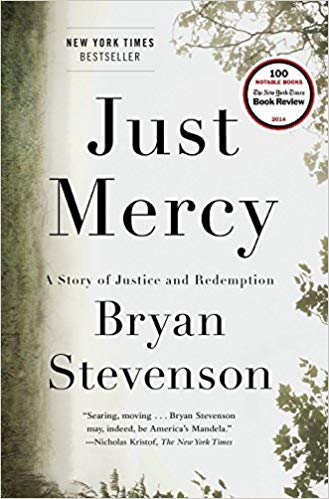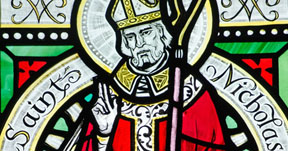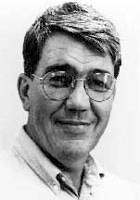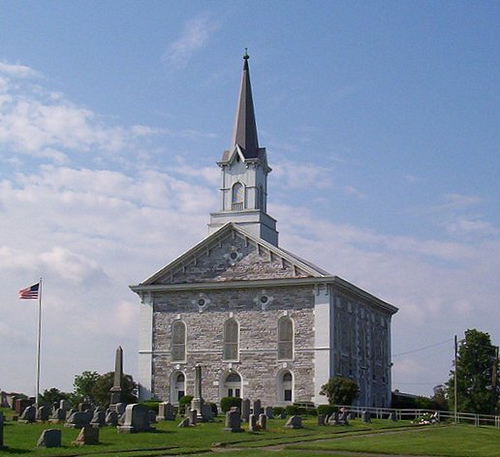December 2018
|
Hang Your Head
Denying yourself in December isn’t easy, I know. Everything
around us leads to self-indulgence during this month. But Jesus
is emphatic that we are to deny ourselves if we are to follow
him – and to do that even on a daily basis (Luke 9:23).
Have no fear, however. The church will help you do this
– with the words of confession and forgiveness at the
beginning of the Sunday morning liturgy. Look forward to
them during Advent. Prepare for them before you come to
church. And also find strength to fulfill this
obligation by learning to hang your head with Luther.
Yes, for it was Luther who stressed confession and
self-denial. He knew that our holiness was in rightly
striving to be faithful – and not in being fully
“rescued from… all wicked opinions and errors.”
Therefore the church ought always “confess its sin and
pray that its trespasses may be forgiven.” That’s
because Christians don’t want “to deny Christ, to lose
the Gospel, [or] to cancel their Baptism.” So fight with
Luther against the continuing “uncleanness” of our
flesh. Don’t be “puffed up” by a “fictitious” holiness.
Let us “hang our heads [and refuse to] trust in our own
good works [and run instead] to Christ the Propitiator,
who… has an altogether pure and holy flesh, which He
gave for the life of the world” (Luther’s
Works
27:85–86). Hang on to all of this during December —
while hanging your head with Luther.
Pastor Marshall |
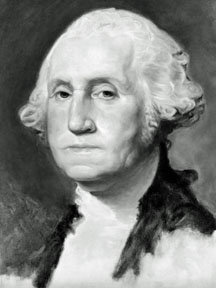 |
|
Washington
on Luke 19:17
“Washington couldn’t bear anything slovenly, ‘I shall begrudge
no reasonable expense that will contribute to the improvement
and neatness of my farms’…. No detail was too trivial to escape
his notice, and he often spouted the Scottish adage ‘Many
mickles make a muckle’ – that is, tiny things add up’ [see Luke
19:17].
[Ron Chernow,
Washington: A Life
(New York: Penguin, 2010) p. 119 –
Winner of the Pulitzer Prize.]
|
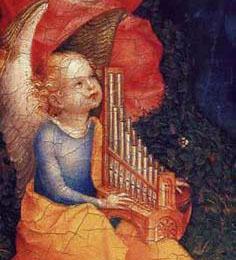
Join us for the Four Sundays of Advent
Sundays:
8:00 am Holy Eucharist, in the chapel
10:30 am Holy
Eucharist, in the nave
8:00 pm Compline, in the
chapel
THE NATIVITY OF OUR LORD
Celebrate with us the great Christmas feast of our Lord's
Nativity.
May these days fill your prayers with thanksgiving and blessing.
Monday, December 24, 2018:
Christmas Eve
Liturgy of Lessons, Carols, & Holy Eucharist
11:00 pm Holy Eucharist, in the nave
Tuesday, December 25, 2018:
Christmas Day
Festival Liturgy & Holy Eucharist
10:30 am Holy Eucharist, in the nave
Wednesday, December 26, 2018:
St. Stephen, Deacon and Martyr
11:45 am Holy Eucharist, in the chapel
Thursday, December 27, 2018:
St. John, Apostle and Evangelist
11:45 am Holy Eucharist, in the chapel
Friday, December 28, 2018
The Holy Innocents, Martyrs
9:00 am Holy Eucharist, in the chapel
To end the 12 days of Christmas be sure to join us on –
Sunday, January 6, 2019
The Day of Epiphany
8:00 am Holy Eucharist, in the chapel
10:30 am Holy Eucharist,
in the nave
8:00 pm Compline, in the chapel |
|
PRESIDENT'S REPORT....by
Bob Baker
In January our book discussion after the Liturgy on Sunday the 20th will be Just Mercy: A Story of Justice and Redemption, by Bryan Stevenson. It features an account of Stevenson, an attorney, meeting and working with Walter McMillian who was put on death row even before he was tried for the murder of Ronda Morrison. Morrison was killed while McMillian and a friend worked on his truck and other friends and family enjoyed a fish fry at McMilliam's home to raise money for church (p. 50f.). The setting is Monroeville, Alabama, made famous by Harper Lee's novel To Kill a Mockingbird. What does Stevenson mean by 'mercy' and 'redemption', and how does his use of these words compare with ours? What motivates and drives Stevenson to "serve the least of these" (p. 318)? What are the implications for how we live obediently (Romans)? Join us to discuss this award-winning #1 New York Times bestseller. Sandwiches from Husky Deli are available for $10, or you may bring your own lunch. Bu
|
STEWARDSHIP
Gentling the
Horse: a Stewardship Reflection I once saw a horse being “gentled” rather than broken. Little by little he was made accustomed to human touch until he took a bridle and reins, and consented to being guided. Then little by little he was made accustomed to weight on his back, until he did not object to a saddle. Finally he tolerated the weight of the rider. Giving a little more and a little more to the Church to reach the level of tithing is like that.
The necessity of tithing is not
hard to understand.
If we believe and expect to worship, want to hear the Word
ourselves, and want for others to hear it, then we must give –
and give enough – of both our possessions and our time, to the
Church. This is
harder to do than to understand, because it involves us in a
struggle against the world and ourselves.
That no doubt is part of its purpose.
The world teaches us to think in
certain ways about money, and we are apt learners.
Since it is hard to earn in the first place, it is hard
to part with. We
readily think that it is we ourselves who produce the money.
The world thinks more highly of us if we have more money
than others. We
have more money because we deserve it, from our hard work and
our talents. We are
like wild ponies when it comes to our hard-earned money.
Giving to the Church involves us in
a different mentality.
No matter how hard it was to earn, my money isn’t my own
in God’s eyes.
According to the world, by working I take resources into my own
control – justifiably because I worked for them – but in God’s
eyes they are all His, just as I am His creation.
He makes all Creation from nothing – which really means
that He provides it out of Himself – and asks only a small
portion in return.
From that point of view, it is the best “deal” going.
God gives everything we are and have, everything that is,
out of Himself, and expects us to give back only a relatively
small part of our possessions.
This we still find hard to do.
The weakness for most of us starts
not in financial circumstance but the strength of our belief in
an unseen Creator God.
It is not the only way we find our faith to be weak.
So let us look to the Word and the sacraments in our
weakness.
Do we also sense that on his terms
God does not honor us for sacrificing from ourselves?
In the first place, one cannot sacrifice what is not even
one’s own in God’s eyes.
So why should He think highly of us for doing it?
We are like the servants in the parable in Luke 17.9-10,
“when you have done all that is commanded you, say, ‘We are
unworthy servants; we have only done what was our duty.’”
So in obedience we are not heroic in God’s eyes.
We are simply honoring God as we should.
Sometimes the Church (not FLCWS)
itself forgets this, and turns giving to the Church into a
worldly seeking after personal honor.
So-and-so is a “great patron” of the Church, because he
gave such-and-such.
But that is a terrible deformation of stewardship.
Stewardship is only about God’s worth, not our own.
There is actually great freedom in
doing God’s will and not being noticed in the world’s eyes.
It frees us from our own vanity, and self-centeredness.
Martin Luther – is it any surprise? – tells of this
paradox in The
Bondage of the Will.
─Earl Nelson,
Church Council |
 |
|
Let It Be
On Luke 1:38
By Pastor Marshall Here are some
representative lines from Gracia Grindal’s new set of sonnets,
The Sword of Eden: Eve
and Mary Speak (2018) (page 42): Suddenly my
destiny was not my own. Knit to
another by natural bonds of flesh Whose ends
loomed in the distance, bright, unknown. Fear and hope
dazzled me, far ahead. Ancient
prophecies in me fulfilled: A force from
Eden whose end I could not see As a donkey
carried me up over the hills To Bethlehem,
Egypt, Gethsemane… |
|
SainT
NICHOLAS FAIRE
Sunday, December 9 from 4:30pm to 7:30pm
In a week or so we will be gathering in the “transformed” Parish
Hall to celebrate Saint Nicholas Day by hosting an event to
commemorate the generous spirit of Saint Nicholas.
His many acts of charity are legendary.
All proceeds from this Faire will be donated to the
West Seattle Food Bank
and the West Seattle
Helpline.
Here’s a sampling of the gift baskets that will be available to
bid on…….
Children’s Books
Car Washing Gear
Children’s Science Gear
Beer & Wine
Gardening
Baked Goods
Seahawks Gear
Olive Oil/Vinegar
Ceramic Items
U of W Gear
Handmade Quilt
Walking/Trekking Gear
Pasta & Sauce
Outdoor Accessories
Linens/Pillows
Kitchen Gadgets
Tools
“Hello Kitty”
Holiday Items
Barware
Baking Tools
Storage Containers
Art Supplies
Tea & Coffee Items
ETC!
ETC!!
ETC!!!
Plus gift certificates to many local restaurants and businesses
like Elliott Bay Pub & Brewery, Husky Deli, Trader Joe’s, West
Seattle Nursery,
Barnes & Noble, Target,
Bartell’s,
Junction Hardware, Spiros, Amazon,
West Seattle Wine Cellars, Admiral Theater, Pegasus
Pizza, Salty’s, ITunes, Staples, ETC!,
ETC!!,
ETC!!!,
ETC!!!!
But in order for it to be a success, we need every member to
participate and commit to helping in some manner.
The sign-up sheets will in the hall between classrooms C
& D until Sunday, December 2nd.
If you missed them and still are able to help and/or
contribute in some way, please contact me (Larraine
206-937-6740). We
have tried to make supporting the Faire approachable and within
reach. There are still a few ways each of us can help — make
money donations (make checks payable to First Lutheran
Church of West Seattle, and note it is to be given to the Saint
Nicholas Faire), and help during the Faire.
But the most
important way to support this event is to come and bring your
family, friends and neighbors, and do your Christmas shopping.
The
Saint Nicholas Faire has a dual purpose — it benefits two very
deserving extended ministries, and it allows us to have a
“party” together with family and friends – while supporting our
neighbors in need from our community.
Now that’s a WIN! WIN!
So please plan to come and join in the celebration.
DON’T MISS IT!!!!!
Larraine King |
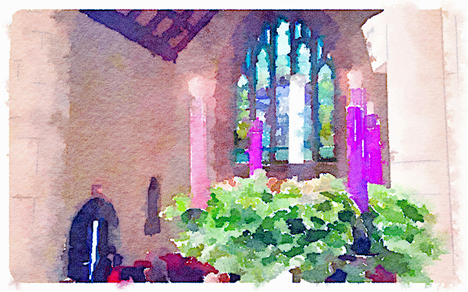
ANNOUNCEMENTS:
DECORATING SIGN UP LIST:
Please sign up if you are able to help with decorating
this year. The sign
up sheet is posted in the hallway by room C.
PASTOR MARSHALL’s
next four week class on the Koran starts on Thursday, January
10th. Call the
office to register for the class.
FOOD BANK COLLECTION
suggested donation for December is holiday foods.
And, don’t forget to bring a couple of cans of food to
the Saint Nicholas Faire!
SACRAMENT OF PENANCE:
Saturday., December
15th, 3-5 pm.
CHRISTMAS CAROLING PARTY:
Thursday, December 27th, meet at Christo’s on Alki at 5:00 pm
for a no host meal.
Then go caroling to shut-ins in the congregation.
Everyone is welcome to come along.
Please sign up on the list that is posted in the lounge.
Compass Housing
Alliance
is in need of Christmas gift items for their housing centers for
both men and women. Please leave your donations at the office.
The items will be delivered before Friday, December 14th.
2018 FLOWER CHART:
The new chart will be up at the end of the month.
Sign up early for the best choice of dates.
|
|
Dr. Nestingen A new book is
out honoring the life and work of Dr. James Nestingen. The
collected essays in this book covering his influence are
“probing and questioning in nature, and at the same time
expositional and proclamatory.” Here is a passage from a lecture
by Dr. Nestingen from the appendix to this book: “Jesus said,
‘Where two or three are gathered in my name, I can’t help
myself. I mean, if there are just two or three we can start a
conversation. I’ve got another chance to give myself away.’
That’s Him, spilling over with goodness, gracious beyond any
measure, giving Himself. ‘Two or three, that will do. Just give
me a couple. I’ll take two. If you can get three, so much the
better.’ Of course, you know what would happen if Chicago [and
the ELCA leadership] got a hold of that. Well now, two or three.
Let’s see. There’s the president and there’s the vice president,
and there’s the secretary. And of course the president better be
in succession, because I mean, we don’t want the gospel getting
loose. Faith might happen. Come on! You have to do all properly
and in good order. The anal retentive’s view of the Kingdom of
God. You just wish somebody would break loose like Jesus did at
the Temple and bust something. Just for the joy of a little
chaos” (261–62).
[Handing
Over the Goods:
Determined to Proclaim Nothing
But Christ Jesus and Him Crucified –
A Festschrift in Honor of Dr.
James Arne Nestingen,
2018.]
|
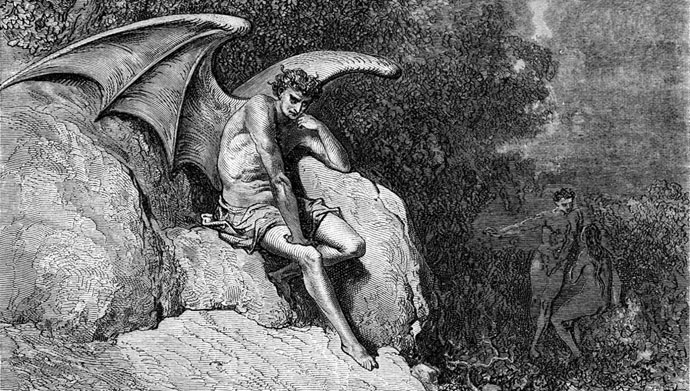
Satan In Martin
Luther’s Small Catechism
(1529) he teaches us to pray in the morning and evening that the
wicked one have no power over us. That is about the devil. But
what do we know about Satan or the devil? Here is a passage that
may be of some help – which appears to be an elaboration on
Revelation 12:12; 2 Corinthians 4:4; 1 John 5:19; 1 Peter 5:8;
and 1 John 3:8:
|
 |
|
Frankenstein
Rejecting Ezekiel 33:11 and
Following Job 2:9
By Pastor Marshall
Mary
Shelley’s (1797–1851) classic horror novel,
Frankenstein; or, The
Modern Prometheus (1818), turned two hundred this year (see
Rebecca Brown,
Frankenstein 200, 2018). But why should the church care
about that? Robert M. Ryan, longtime professor at Rutgers
University, answers that question with his chapter 6, “The
Christian Monster,” from his book,
The Romantic Reformation
(1997). While it is well known that Frankenstein is the
scientist who assembles a human from dead body parts and
enlivens him with some sort of electric shock – it’s less well
known that the monster becomes a Christian (Vol. 2, ch. 7) and
Frankenstein doesn’t (Vol. 3, ch. 7). Plus when the monster, out
of frustration over being rejected by his fellow humans becomes
violent, he repents (Vol. 3, ch. 7). But all Frankenstein wants
to do is kill his creation. Pointing out this less well known
contrast is the burden of Ryan’s chapter 6. But he is quick to
say that what this all stands for isn’t very clear. He does
argue, however, that the kindness toward sinners in Ezekiel
33:11 is rejected by Dr. Frankenstein, and the monster takes up
the recklessness in Job 2:9 toward Frankenstein. All that leads
me to think that Shelly was hinting at the goodness of
Christianity in the face of the attacks leveled against it by
science, as well as the failure of science, with its pride in
itself, to adequately consider the moral risks of its work. |
|
Christ Evangelical Lutheran
Church
275th Anniversary
By Pastor Marshall As we
celebrate our 100th Anniversary, we also give thanks for the
275th Anniversary of Christ Evangelical Lutheran Church in
Womelsdorf, Pennsylvania (75 miles west of Philadelphia). They
are a small congregation, but they have had a full year of
festivities including presentations on the Dutch dialect their
early members spoke, and viewing a movie (Alone
Yet Not Alone) made about Regina Leininger who was captured
as a girl and raised by local Indians between 1755–1763. They
have only had nineteen ministers serve their congregation over
these nearly three hundred years in the Stouchsburg historic
district of Marion township. |
|
Jonah 1.15
Monthly Home Bible Study, December 2018, Number 310
The Reverend Ronald F. Marshall
Along with our other regular study of Scripture, let us join as
a congregation in this home study. We will
study alone then talk
informally about the assigned verses together as we have
opportunity. In this way we can "gather
together around the
Word" even though physically we will not be getting together
(Acts 13.44). (This study uses the RSV translation.)
We need to support each other in this difficult project. In 1851
Kierkegaard wrote that the Bible is "an extremely dangerous
book....[because] it is an imperious book... – it takes the
whole man and may suddenly and radically change... life on a
prodigious scale" (For
Self-Examination). And in 1967 Thomas Merton wrote that "we
all instinctively know that it is dangerous to become involved
in the Bible" (Opening
the Bible). Indeed this word "kills" us (Hosea 6.5) because
we are "a rebellious people" (Isaiah 30.9)! As Lutherans,
however, we are still to "abide in the womb of the Word" (Luther's
Works 17.93) by constantly "ruminating on the Word" (LW
30.219) so that we may "become like the Word" (LW
29.155) by thinking "in the way Scripture does" (LW
25.261). Before you study then, pray: "Blessed Lord, who caused
all holy Scriptures to be written for our learning: Grant us so
to hear them, read, mark, learn and inwardly digest them, that
we may embrace and ever hold fast the blessed hope of
everlasting life, which you have given us in Our Savior Jesus
Christ. Amen" (quoted in R. F. Marshall,
Making A New World: How
Lutherans Read the Bible, 2003, p. 12). And don’t give up,
for as Luther said, we “have in Scripture enough to study for
all eternity” (LW
75:422)!
Week I.
Read Jonah 1.15 noting
the line the sea ceased
from its raging. How did the mariners know that drowning
Jonah would stop the storm? On this read Jonah 1.12 noting the
words throw,
then,
quiet,
know and
because. But how did
Jonah know that? On this read Leviticus 4.31 noting the words
burn,
pleasing,
atonement and
forgiven. Read also
Leviticus 4.27 noting the phrase
if any one… sins. But
how does killing an animal please God when someone has sinned?
On this read Numbers 25.1–15 noting
bowed,
Baal,
anger,
slay,
weeping,
pierced,
turned,
wrath and
jealousy. Why does
this death turn God away from his wrath and toward mercy and
kindness? On this read Leviticus 24.20 noting the line
as he has disfigured a
man, he shall be disfigured. Why is this establishing of
balance required? On this read Isaiah 61:8 noting the line
I the Lord love justice.
And it is justice that requires this balancing. But why does God
love justice? On this read Matthew 20.10–15 noting the words
more,
equal and
allowed. How is this
fair since there isn’t any balancing out – as in equal pay for
equal work? On this read 1 John 1.9 noting the word
just – and the
balance between sin
and confess, as well
as, confess and
forgive. Why do
we favor 1 John 1 in our
church confession instead of Matthew 20? Note the line
the wickedness of the wicked shall be upon himself in
Ezekiel 18.20 – unlike Exodus 20.5. Do you agree? Why or why
not?
Week II.
Read again Jonah 1.15
noting the same line the
sea ceased from its raging. What did the mariners think of
that? On this read Jonah 1.16 noting the words
then,
feared,
sacrifice and
vows. Why were they
so positive? On this read Psalm 119.45 noting the words
liberty and
precepts. How is that
so? On this read Luke 13.3 linking
repenting or
perishing. How
valuable is being free from dying? On this read Psalm 146.2
noting the word praise.
Is that sufficient reason for staying alive? On this read
Philippians 1.22 noting the word
fruitful. How
important is it to help others? On this read 2 Timothy 1.7
noting love and
self-control. How
much do they help? Are they very important because of the word
heartily in
Colossians 3.23?
Week III.
Reread Jonah 1.15 noting
again the line the sea
ceased from its raging. What made this sacrifice work? On
this read Jonah 1.17 noting the line
Jonah was in the belly of
the fish three days and three night. How did this sacrifice
work if Jonah didn’t die? On this read Jonah 2.3–6 noting the
words deep,
flood,
billows,
presence,
closed,
wrapped and
bars. Were these
horrors equal to dying? On this read Jonah 2.6 noting the line
yet thou didst bring my
life from the Pit. This deliverance sounds like the opposite
of dying – so those ocean horrors would be like dying since they
were bad enough to escape from. And that’s why being thrown into
the ocean worked to appease God’s wrath.
Week IV.
Read Jonah 1.15 one last
time noting that line the
sea ceased from its raging again. Why was Jonah being
punished in the belly of the fish? On this read Jonah 2.8 noting
idols. Had Jonah
worshipped idols? On this read Jonah 1.3 noting the line
but Jonah rose to flee…
from the presence of the Lord. Was that disobedience like
worshipping idols? On this read Luke 11.28 noting the words
hear and
keep. Jonah heard the
command to go to Nineveh but he didn’t keep it and obey. Why did
God forgive Jonah and tell him to do the same thing a second
time? On this read Jonah 3.3 noting the line
so Jonah arose and went.
How did God know that Jonah would go the second time? On this
read Jonah 2.9 noting the line
I… will sacrifice to thee.
Is that contrition enough to get God to give Jonah a second
chance? On this read Jonah 4.2 noting the line
thou art a gracious God
and merciful, slow to anger, and abounding in steadfast love,
and repentest of evil. What does that add to Jonah’s
confession? Why does it tip the scales to mercy? |
Remember in prayer before God those whom He has made your
brothers and sisters through baptism.
Bob & Barbara Schorn, Eileen Nestoss, Marlis Ormiston, Aasha
Sagmoen & Ajani Hammond, Kyra Stromberg, Melanie Johnson, Matt
Anderson, Jeannine & Gregory Lingle, Tabitha Anderson, The PLU
Lecturers, Celia Balderston, The Rev. Paul Smith, The Rev. John
Hinderlie, The Rev. Dan Peterson, The Rev. Mary Rowe, Jim &
Hillary Thoren, Sheila Feichtner, Deanne & Lucy Heflin, Rubina &
Marcos Carmona, Richard Uhler, Yuriko Nishimura, Marylou & Paul
Jensen, Chris & Margeen Boyer, Antonio, Mary Hanson, Jessica,
Jeff Walkenhauer, Rebecca Brown, Jean Middleton, Mary Leskovar
and pray for the Central American refugees on the Mexican
border.
Pray for the shut-ins that the light of Christ may give them
joy: Bob & Mona Ayer, Bob & Barbara Schorn, Joan Olson, Chuck &
Doris Prescott, C. J. Christian, Dorothy Ryder, Lillian
Schneider, Crystal Tudor, Nora Vanhala, Anelma Meeks, Mary
Goplerud, Martin Nygaard.
Pray for our bishops Elizabeth Eaton and Brian Kirby Unti, for
our pastor Ronald Marshall, our deacon Dean Hard and our cantor
Andrew King, that they may be strengthened in faith, love and
the holy office to which they have been called.
Pray that God would give us hearts which find joy in service and
in celebration of Stewardship.
Pray that God would work within you to become a good
steward of your time, your talents and finances.
Pray to strengthen the Stewardship of our congregation in
these same ways.
Pray for the hungry, ignored, abused, and homeless this Advent &
Christmas. Pray for
the mercy of God for these people, and for all in Christ's
church to see and help those who are in distress.
Pray for our sister congregation:
El Camino de Emmaus in the Skagit Valley that God may
bless and strengthen their ministry.
Also, pray for our parish and it's ministry.
Pray that God will bless you through the lives of the saints:
Saint Thomas, Apostle; Saint Stephen, Deacon and Martyr; Saint
John, Apostle and Evangelist; and The Holy Innocents, Martyrs. |
|
A Treasury of Prayers O Lord God, I do not rely on my own good
deeds but on your great mercy. What am I, after all? What can I
say before you? — for my power is nothing, and my learning is
without insight. To you my life is shallow and my superiority
over the animals is nothing. In your mercy, make me pure, O
Lord, that I may one day live eternally in your glory. In Jesus’
name I pray. Amen.
[For All the
Saints II:1262, altered] |

